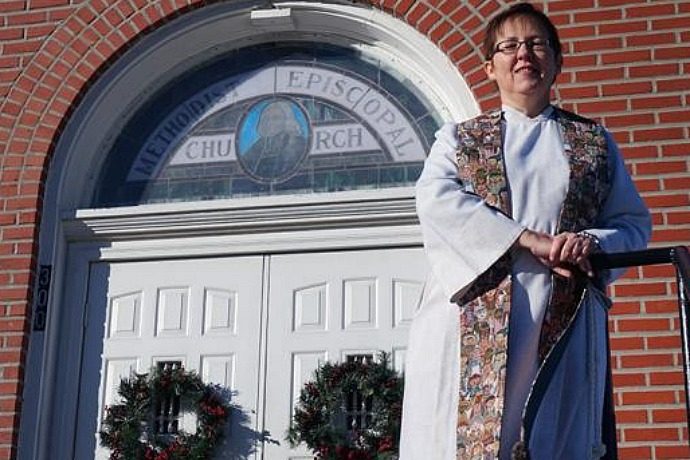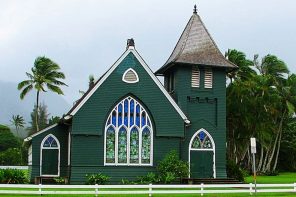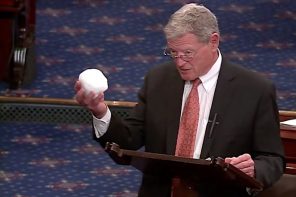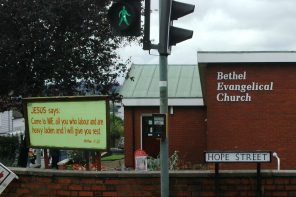Rev. Cynthia Meyer came out to her congregation at the start of this year. A soft-spoken pastor from Edgerton, Kansas, Meyer is one of many United Methodist clergy who have chosen— in the wake of their church’s decision this past spring to uphold its official policy that homosexuality is “incompatible with Christian teachings”—to risk their careers and go public.
Meyer’s announcement was not embraced by the regional church leadership with open arms. In fact, within days charges were brought against her for violating the UMC’s official policy against openly gay individuals practicing as clergy.
Despite the fact that her own congregation accepted her choices, the Bishop of The Great Plains Conference where she serves ruled to suspend her for a minimum of two years. As a result she is now faced with a difficult decision: wait out the suspension in hopes of being reinstated, or leave the church.
I spoke with Cynthia just before her suspension began.
___________
Joel Pitney: How did you get into the ministry?
Cynthia Meyer: My family did not participate actively in the church at all, but as a junior high kid, I was drawn to youth group. So I got involved in my local United Methodist Church pretty deeply during my junior high and high school years, participating in youth programs and trips. The church helped me learn about the world. That really meant a lot to me. By the time I was a senior in high school, I had a conversation with the pastor about feeling called to ordained ministry. I was ordained in 1990, so 26 years ago.
I was ordained into the Kansas East Annual Conference, which is now part of the Great Plains Conference. And I’ve always kept my membership here. Prior to that, I had been the Dean of Students at Candler School of Theology at Emory in Atlanta. My most recent appointment, which I’m just finishing up in the next couple of weeks, is in Edgerton, Kansas. It’s a small town just outside of Kansas City. Our attendance right now is averaging 50 or so, I think.
Could you tell me about your recent suspension. What exactly happened?
I had been in discernment for some time about my future in the church. I unexpectedly became involved in a relationship after trying not to do that for a long time. I needed to figure out how I could live with integrity and be authentic to all the parts of myself. So on Epiphany Sunday—January 3rd of this year—I preached a sermon to my little congregation, in which I let them know that I was in a relationship with another woman, and things proceeded from there.
I had decided if I was going to take this kind of step, that I wanted it to be meaningful in a larger way, and so I partnered with the Reconciling Ministries Network. The sermon was filmed and went public pretty quickly. I also shared the sermon with my district superintendent, and he filed the charge against me a couple of days later.
You were charged by your superintendent because acting clergy are forbidden from engaging in same-sex relationships in the United Methodist Church?
That’s correct, though many conferences don’t acknowledge this rule. That began a process of working with our Bishop to come to a “just resolution.” We were quite a ways apart, so we brought mediation into the process. We eventually reached an agreement, but I would not say it’s either just or a resolution.
What is the agreement?
Since September 1st, I’ve been on an involuntary leave of absence. I will still have my credentials, but I will not be able to serve as a clergy or perform the duties that are restricted to clergy.
That’s within the entire United Methodist Church, not just your conference?
Right.
One thing I find interesting about this is that I grew up in the Oregon-Idaho Annual Conference, and it’s a much more inclusive atmosphere there. The leadership is almost entirely supportive of LGBT members and clergy, and there are many, many reconciling congregations. You’re in a much more conservative area of the country and of the church, and I’m curious to know what the general attitude towards LGBT people is? Do you find that there are more supportive people in the general membership than in the leadership?
My congregation has been very supportive. A small number of people chose to leave. Some of them not because of their feelings around the issue of homosexuality, but they just struggled with the church being in the news. But that was a small number, and most folks have been very receptive. Many immediately began telling me about their family members, and all of their personal stories.
My vulnerability in sharing let them open up, and we had great conversations. They’ve really hung in there. The church is not yet a reconciling congregation, but they had done some study about that before I had arrived, and they’re getting ready to move in that direction. I don’t think it’s going to happen while I’m still there, but most of them really want to do it. They’re very open, welcoming and affirming. It’s just terrific.
People probably wouldn’t expect that. It’s a very low-income, blue-collar, tiny rural town, but folks are not conservative around this kind of issue. They’re loving. They reach out to everybody. I think that’s true of a lot more “people in the pews” than some in the church want to recognize.
The primary difficulty in this conference really has been the Bishop. While he claims to be more in the center, he’s quite conservative on this issue, and very, very tied to the letter of the law of the book of discipline—at least those seven words.
And those seven words are “Homosexuality is incompatible with Christian teachings”?
There are a couple of things that are relevant, really. “Homosexuality is incompatible with Christian teaching,” on one hand. And then there’s the actual chargeable offense, which is that self-avowed, practicing homosexuals may not serve as clergy.
That was the only charge made against me.
You obviously don’t agree with that language. Why do you think that’s off-base from a theological perspective?
My understanding of Christian teaching centers on the Gospels, and what we know about the teachings and actions of Jesus. I don’t think Jesus was really looking to label people as incompatible, no matter who they were. The Gospel is then the lens through which I look at all of scripture, which I think we should base all of our actions, choices, theology and doctrine. Jesus tended to reach out to those who were different, who were marginalized, excluded and judged. In our time, that would certainly include the LGBT community.
Why then do some people hone in so much on this issue? What is it with this fixation within the United Methodist Church and across the more conservative factions of all the denominations of Christianity?
There’s a real hang-up around sexuality. Variance in sexuality is hard. It’s one of those things that folks have a real hard time grasping. Culturally, there have been taboos for a long time, and some folks have trouble letting that go.
I also think folks that have various kinds of privilege and power often feel strengthened if there is some group that is excluded. There are not so many groups left to exclude anymore.
I’m curious what your plans are now that you’ve been given this suspension? I know that a lot of people who find themselves in your position just leave the denomination and either go to one that’s much more open or move on and do something else.
I don’t have any immediate plans to leave the denomination. I’m trying not to make any rash decisions right now. I want to give it some time. I’m very grounded in the United Methodist Church and the Wesleyan tradition. That’s really meaningful to me, and I would love to be a part of a denomination that would decide to live in a more faithful way—faithful to Jesus and faithful to John Wesley. So I’d like to be able to stay in the denomination and find ways to serve.
At the same time, I’m in a very odd position. The agreement leaves my charges pending until the next General Conference in 2020, or it could be as early as 2018 or 2019 if there’s a special conference held to look at these issues around LGBT inclusion. In either case, that’s a long time to be waiting and to not know what’s going to happen. Right now, I’m really open to the possibilities for ministry and work that is meaningful, and I’d love to do that within the United Methodist Church. But I’m open to visiting with others too, and we’ll see where it goes.
I don’t know when I’ll be allowed to preside over sacraments again. That’s a hard thing and will impact my decisions going forward.
What did you think of the recent decision by the Western jurisdictions to appoint Karen Oliveto, who is an openly gay clergy, to become Bishop of the Rocky Mountain Conference? Did it give you hope that change, as rough and slow as it is, is afoot?
It’s a very encouraging and exciting thing for Karen to be elected and consecrated as Bishop. I eagerly watched all of that happening and was just thrilled and moved by the decision. In some ways, I actually found the General Conference to be hopeful, even though it almost resulted in a split within the church over LGBT issues. It wasn’t the actions or lack of actions taken that I found to be hopeful, but the commitment and hard work of those seeking justice and inclusion. I was glad to be part of that. So many people are deeply committed, and prayerfully working so hard.
There may be limits around how long we can keep up that kind of fight while being excluded. The next couple of years are really significant in whether people will stay, and whether the church will remain one church.
In the United Methodist Church, like any Christian denomination, there’s a lot of time and energy being spent on attracting more young people. How does the church’s stance on homosexuality hinder their ability to grow and attract new people?
The church, in its policies and its ongoing adherence to exclusion, is causing the denominations great harm. Younger people in general are very open, and do not want to be a part of an institution that is going to exclude them, or their friends. I have a daughter who is 21, and she really has no interest in the United Methodist Church at this point. That’s a sad loss.
So many people who might otherwise be attracted to the United Methodist Church—with its care for the larger world and commitment to social justice—are put off by the stance on these issues. Those who are LGBT, or who have family members or people important to them who are LGBT (and that includes about everybody), now face the choice of whether or not to be a part of a religious body that does not feel their very worthy love lives are in fact fully worthy. People are raising those questions, and it’s very harmful to the future of the church.





